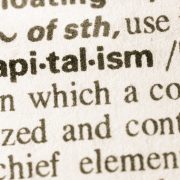Near the end of Chapter 1, the author of Waking America’s Revolutionary Mind, Brad Thompson, makes an important distinction among two fundamental concepts,
Laws of nature are moral principles discovered by reason that help us achieve fundamental values. Rights of nature recognize certain requirements of human nature. These laws protect the rights of individuals, from which the laws of nature are deduced.
He goes on to say that “Locke describes these qualities not as moral principles but as facts of human nature that indicate certain moral principles. Locke has transitioned from what is (freedom and equality) to what ought to be (self-ownership). Which means that property is naturally just.” This is the perfect segue into Chapter 2 – Declaring the Laws of Nature.
Today, it doesn’t require amazing cognitive skills to see that ‘Laws of Nature’ is one step removed on the deductive reasoning ladder to ‘Independence’. Yet for Thomas Jefferson and his compatriots, it was a radical achievement. As Thompson writes about the Declaration’s first paragraph, “It’s purpose is to declare to the world. It’s principle is defined by the Laws of Nature. And it’s action is defined by the necessity to dissolve. In sum, reason is the means and nature is the the standard by which men must distinguish between freedom and slavery.”
In his Notes of the State of Virginia, Jefferson best relates the efficacy of reason,
Reason and free inquiry are the only effectual agents against error. They are the natural enemies of error. Reason and experiment have been indulged, and error has fled before them. Truth can stand by itself.
The importance of Jefferson’s assertion is boundless. If “knowledge and objective truth were open to all men” (as Thompson states about Locke’s epistemology in Chapter 1), and error naturally flees when “reason and experiment have been indulged,” (as Jefferson avers in Chapter 2), then any despot’s grip on political power is no stronger than the weak minds that sanction their own victimhood!
To America’s Revolutionary Minds, King George III and his mercantilists were running an 18th century protection racket; as were the Soviet Communists running a 20th century crime syndicate. In America today, its known as progressivism. Thompson informs us in Chapter 2, “To know what injustice and despotism are, one must also know what justice and freedom are.” Today’s progressive public education and media elites deny this.
In all cases, the fundamental principle at stake is individual property rights, whose primary fact is self-ownership. In contrast, all despots promote some form of collectivism, whose primary fact is duty to tribe, church, community, or party. Thompson continues, “Quite possibly the greatest achievement of the American Revolution was to free men to follow the dictates of their own minds.” Jefferson elaborates,
Men enjoying in ease and security the fruits of their own industry, enlisted by all their interests on the side of law and order, would be more easily governed than with minds nourished in error and debased by ignorance, indigence, and oppression.
In 1775, the Continental Congress composed its Declaration of the Causes and Necessity of Taking Up Arms, and Jefferson then wrote about surrendering reason: man “has no remaining guard against absurdities the most monstrous, and like a ship without a rudder, is the sport of every wind. Gullibility, which they call faith, takes the helm from the hand of reason, and the mind becomes a wreck.”
Fifty years earlier, in 1725, the co-editor of Jefferson’s Declaration, another Enlightenment hero named Benjamin Franklin wrote,
How exact and regular is the natural world. How wisely in every part contrived. All the heavenly Bodies are regulated with the utmost wisdom! And can we suppose less care to be taken in the order of the Moral than in the Natural System?
According to Thompson, Franklin “implied that the Americans were following the moral law of nature while the British were following the law of armed force.” He also adds, “Jefferson and his fellow revolutionaries understood that there are two basic ways to deal with men in political society: either by faith and force or by reason and freedom.” These two concepts, reason and freedom, are the essential, codependent variables for the only morally defensible socioeconomic system for humanity – Capitalism.
To continue this line of thinking, Thompson again invokes John Adams, who “thought it possible to reason backward from effects to causes and then forward again to the principles that might guide human action.” He also recruits Ethan Allen of the Green Mountain Boys, and whose 1785 treatise titled Reason, The Only Oracle of Man makes reference to his Book of Nature. Thompson summarizes Allen saying, “all entities in nature are interconnected.”
It is this absence of force among interconnected human entities, united only in personal liberty, that is the essence of capitalism.
Consequently, following the great thought leaders of the Enlightenment, “eighteenth century Americans saw a direct relationship between the physical laws of nature and the moral laws of nature as they apply to human action.” It is no coincidence that the great Austrian economist and classical liberal philosopher Ludwig von Mises titled his signature achievement Human Action.
Mises was perhaps the world’s leading 20th century economist for government non-interventionism, objective law, free markets, price theory, and entrepreneurship. Yet a century before Mises was born, in 1775, John Zubly of Georgia presages the necessary conditions for capitalism to flourish,
The will, minds, tempers, dispositions, views and interests of men are so very different, and sometimes so opposite, that without law, which cements and binds all, every thing would be in endless disorder and confusion.
Thompson adds, “Zubly assumed that law and liberty are ‘perfectly consistent, well regulated liberty of individuals is the natural offspring of laws.” Also, it was common for 18th century Americans to publish editorials under pseudonyms, and writing in Boston’s Continental Journal, “Benevolus” is summarized saying, “The most common violation of of the laws of nature is the theft of property.”
He concludes Chapter 2 with a powerful summary about the Revolutionary War period, one that through deductive reasoning, guarantees the individual property rights inherent to self-ownership and voluntary trade free of force,
Americans believed there are moral laws of nature that transcend the laws of men. Such laws must be discovered through reason. They describe cause and effect relationships, between man and nature and between man and man. They prescribe principles of action, and such laws are fixed, absolute, universal, and eternal.













